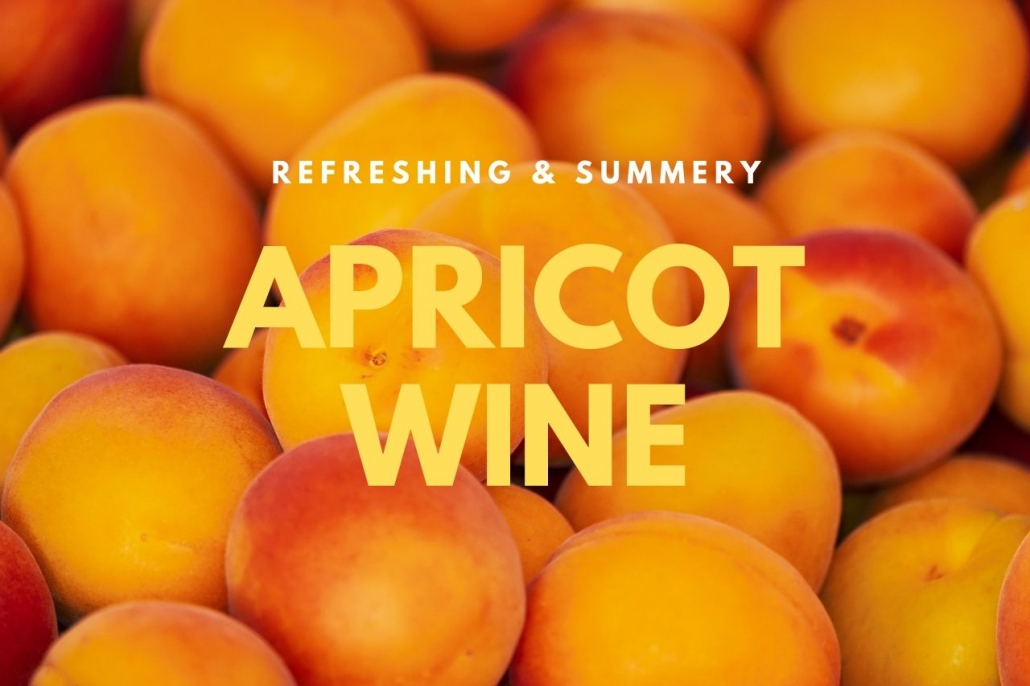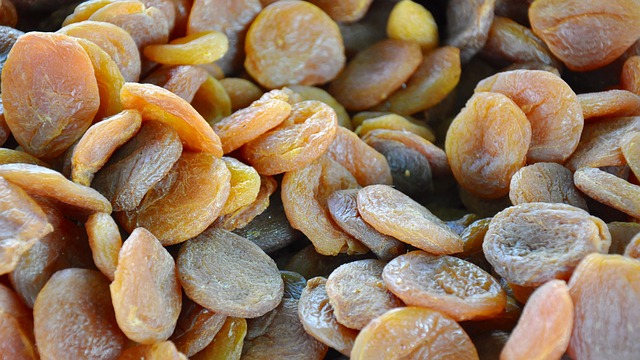Apricot Wine Recipe – Summery Pink/White wine
Apricots can either be a complete joy to eat or a little disappointing. It really depends on how ripe they are and what the weather has been like that year. This apricot wine seems to always be a pleasure to drink.
In a wine the flavour of apricots gives over to a subtly sweet, tartness and a full body that makes sipping it on a warm day a real joy.

Table of Contents
Sweet Summer Apricot Wine
The key to making great apricot wine is finding the sweetest, juiciest apricots you can get your hands on. Unfortunately, most supermarkets seem to stock apricots that have been picked too early and have the same amount of give as a tennis ball.
When picking apricots to make wine you want them to be ripened as much as possible on the tree, in the sun. If you have a tree then you time your picking to the exact second when apricots are at their best. If like me however, and you don’t, you need to spend some time shopping around.
Picking The Best Apricots To Make Wine
I find farmers markets and independent greengrocers the best places to find apricots.
We are looking for softness, juiciness and sweetness, unlike supermarket varieties of apricot which are usually hard and unyielding. If you can find a good source of apricots then stock up. The best way to tell they are sweet and ripe is to taste them.
Ripeness of Apricots
Apricots do seem to get softer and juicer if left in the fruit bowl for a while but never seem to achieve the sweetness of tree ripened apricots.
We want the apricots for our wine to be as ripe as possible which ensures maximum sweetness and therefore sugars available to ferment but also acidity to balance the wine will be better too.
Fresh vs Frozen
You may find frozen apricots in your local store and these often are sweeter and left to ripen longer on the tree than fresh apricots as they are picked and frozen straight away. Frozen apricots are fine for making wine and just need to be thawed before using.
Freezing actually helps extract juice from the fruit as the freezing ruptures the cell walls of the fruit breaking them down.
Secret Weapon For Making Apricot Wine: Dried Apricots

As a further boost to flavour and body I like to include dried apricots along with fresh fruit in my apricot wine recipe.
Dried fruit has been intensified in flavour and sugars by removing water, this results in a big punch of flavour and sweetness which leads to a fuller bodied wine.
Preservative Free Dried Apricots
Many dried apricots are treated with sulphur dioxide which is a preservative that makes them retain their bright orange colour.
Preservative free apricots will be a little browner but much better for including in a wine. They won’t interfere with the yeast and fermentation but add all the flavour and sugar we want.
Apricot Wine Recipe
Equipment What You Will Need For This Apricot Wine Recipe – Makes 1 gallon / 4.5 litres
- Large Stock Pot
- Small Fermenting Bucket
- Demijohn
- Syphon
- Fine Straining Bag
- Airlock & Bung
- Potato Masher
Apricot Wine Ingredients
- 4.5 litres Water
- 1.4 kg / 3lb Ripe Apricots
- 400g / 14oz Dried Apricots (preservative free)
- 900g / 2lb Sugar
- 1/4 tsp Tannin
- 1 tsp Pectic Enzyme
- 1 tsp Yeast Nutrient
- 1 Campden Tablet
- 1 Sachet White Wine Yeast
Apricot Wine Recipe Method
Use half the quantity of water and begin heating in a pan. Stir in the sugar to dissolve and bring to a simmer.
Whilst the sugar solution is heating prepare your apricots. Ensure they are clean and any bad parts removed. Cut them in half and remove the stones and cut into quarters. Leave the skins on. The dried apricots can be thoroughly chopped.
Place both varieties of prepared apricots in the mesh straining bag and place the bag in the fermenting bucket. Pour over the boiling sugar solution and thoroughly mix.
Add the other half of cool water to bring the temperature down. Cover with a lid and airlock and allow to cool to room temperature.
Add the tannin, yeast nutrient and Campden tablet and mix thoroughly, leave the wine must to sit overnight or for at least 24 hours. If you which take a hydrometer reading at this point to confirm the gravity.
After 24 hours add pectic enzyme and mix thoroughly and then sprinkle the yeast onto the surface of the must without stirring. Cover and fit an airlock and allow fermentation to begin.Allow the apricot wine to ferment for at least a week. The airlock should show signs of activity and may even taper off after a week.
After 7 days lift out the mesh bag with the apricot in and allow to thoroughly drain without squeezing it too much. Return the lid to the fermentation bucket and allow the wine to settle. Take a hydrometer reading at this point if you wish to confirm fermentation activity
The next day siphon the wine from the bucket into a demijohn to finish fermentation and begin conditioning. Fit a bung and an airlock and leave at room temperature for a few weeks. After a couple of weeks you will notice sediment forming on the bottom of the demijohn.
After at least 3 – 4 weeks rack the wine to a clean demijohn. To continue conditioning, it is best to leave the apricot wine to condition for a number of months only racking if a considerable amount of sediment has built up. I leave my apricot wine to condition for 4 – 5 months.
After conditioning it is time to bottle the wine. Take a sample and test for sweetness. You may want to stabilize and back sweeten the wine if you find it to dry and can follow this guide. Letting the bottled wine sit for a while is preferable and the flavour will continue to develop in bottles.




What food pairs well with this apricot wine?
It is a quite light, subtle wine so I would suggest delicately flavoured dishes. Maybe fish.
Last night I prepared 5 pounds of dried apricots with 10 pounds of fresh right off the tree apricots in a mesh bag for 4 gallons of wine when I pull that bag in a week can I put it in another bucket used the same and make 4 more plus gallons of wine with the same bag
If you mean to use the same fruit in two batches then you may end up with quite an insipid second batch. If the constraint is the size of the fermenter you have, I would suggest freezing some of the fruit until the fermenter is free. Hope this makes sense.